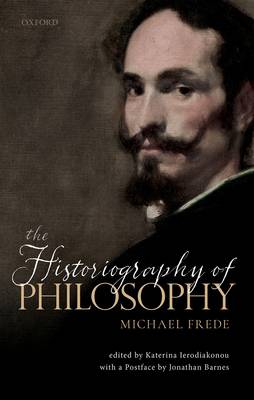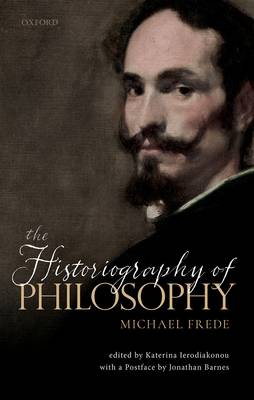
- Afhalen na 1 uur in een winkel met voorraad
- Gratis thuislevering in België vanaf € 30
- Ruim aanbod met 7 miljoen producten
- Afhalen na 1 uur in een winkel met voorraad
- Gratis thuislevering in België vanaf € 30
- Ruim aanbod met 7 miljoen producten
Zoeken
The Historiography of Philosophy
With a Postface by Jonathan Barnes
Michael Frede
Hardcover | Engels
€ 156,45
+ 312 punten
Omschrijving
The Historiography of Philosophy is the text, virtually unchanged, of the Nellie Wallace lectures, which Michael Frede gave in Oxford in 1989-90. In these lectures, Frede is largely concerned with how the history of philosophy has been studied and how it should be studied, that is, how we ought to conceive of and explain what historians of philosophy have been doing and should be doing. He distinguishes three systematical approaches to the history of philosophy, which run under the same heading 'history of philosophy' and deal with the same material, but they are distinct enterprises: Philosophical Doxography, Philosophical History of Philosophy, and Historical History of Philosophy. All three enterprises are considered by him as perfectly legitimate, but he clearly gives priority to the historical history of philosophy, since the other two ultimately have to rely on its findings; for it is only a historical discipline that can determine which position a philosopher of the past, as a matter of historical fact, took and for which reasons he did, in fact, take it. Frede starts his lectures by showing how the historical history of philosophy differs from the two philosophical studies of the history of philosophy; he then examines the historical discipline in more detail, and finally looks into the consequences of its practice. This volume also contains three previously published articles by Frede on the same topic, a preface by Katerina Ierodiakonou that places Frede's lectures in context, and a postface by Jonathan Barnes that discusses and criticizes Frede's views.
Specificaties
Betrokkenen
- Auteur(s):
- Uitgeverij:
Inhoud
- Aantal bladzijden:
- 258
- Taal:
- Engels
Eigenschappen
- Productcode (EAN):
- 9780198840725
- Verschijningsdatum:
- 13/04/2022
- Uitvoering:
- Hardcover
- Formaat:
- Genaaid
- Afmetingen:
- 149 mm x 223 mm
- Gewicht:
- 439 g

Alleen bij Standaard Boekhandel
+ 312 punten op je klantenkaart van Standaard Boekhandel
Beoordelingen
We publiceren alleen reviews die voldoen aan de voorwaarden voor reviews. Bekijk onze voorwaarden voor reviews.











